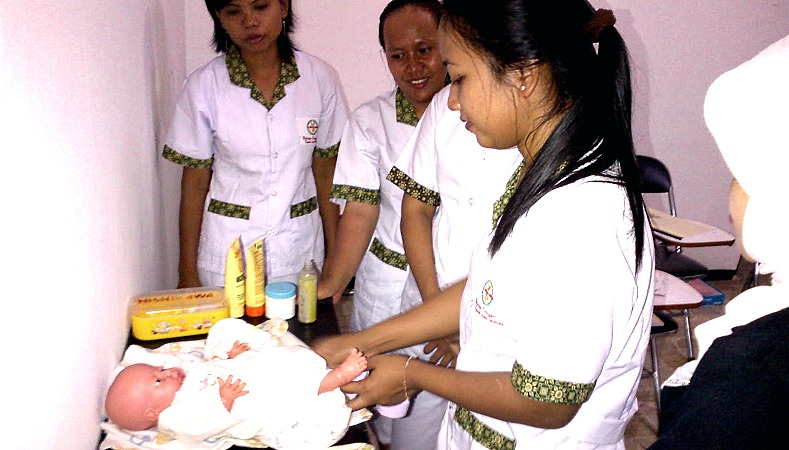President Joko “Jokowi” Widodo urged the House of Representatives to prioritize deliberation of the domestic worker protection bill.
After 19 years, the call signals hope that the wait might finally be over, and the bill passed.
However, a policy for domestic worker is only one of the steps toward gender and social justice.
In addition to implementing social protection policy, the country still needs to invest in care responsive infrastructure and public facilities.
As the ASEAN chair this year, Indonesia can lead by example and demonstrate strong political will to create the enabling environment for care economy at both the national and regional level.
The Indonesian government is investing in care infrastructure and programs like the National Program for Community Empowerment (PNPM) which aims to improve access to childcare, health services, and education for low-income families.
Indonesia’s National Social Security System (BPJS) has also expanded its coverage to include health services for older people, which aims to improve the access to healthcare for elderly population.
These kinds of interventions impact both the care providers and care recipients and can be transformative in achieving gender justice.
Gender inequality in both economic and political arena is one of the pervasive forms of inequality.
Women lack access to equal opportunities of education, healthcare, food and jobs having detrimental impact on their lifetime outcomes.
In addition to the unequal access to opportunities and income inequality, women also face gender-based violence, discrimination, and disproportional burden of unpaid and low paid care work.
These are the major determinants of gender inequality leading to the overall economic inequality worldwide and in Asia pacific.
Care work is vital for our societies and the economy. It includes work that we see happening around us in our households, like childcare, elderly care, care for persons with disabilities and, domestic activities like cooking, cleaning, washing, mending and fetching water and firewood.
Without someone investing time in these daily jobs communities and economies would grind to a halt.
Across the world, unpaid care and domestic work is disproportionately done by women and girls, especially those living in poverty.
They undertake more than three-quarters of unpaid care work and make up two-thirds of the paid care workforce.
Oxfam has estimated that the monetary value of this unpaid care work is at least US$10.8 trillion annually.

Care at Work, a report by the International Labor Organization in 2022 revealed that 40 percent of Indonesian women leave the workforce because of marriage and childcare and become unpaid care workers.
On average, housewives in Indonesia worked for 13.5 hours at home, double the average working hours of women in the Asia Pacific.
The care in the time of coronavirus report reveals that while COVID-19 and the related containment efforts have caused increases in both women’s and men’s unpaid care workloads, women are still doing the bulk of this work.
Yet, care is a critical social good and can be a key driver of growth. Greater investment in care services could create more than 10 million jobs in Indonesia, according to ILO.
Although it lays the foundation for a thriving society, unpaid and underpaid care work is undervalued by governments. It is often treated as “non-work,” with spending on it treated as a cost rather than an investment, leading to care being rendered invisible in measures of economic progress and policy agendas.
As part of post COVID recovery, critical investments need to be made towards the care economy as these would help to address some of the country’s most pressing social and economic challenges, such as poverty and inequality.
Gender equality and women’s participation in social-economic-political-cultural dimension is an important agenda for ASEAN.
The ASEAN’s adoption of the ASEAN Comprehensive Framework on Care Economy in 2021 provides guidance in taking forward this transformative regional agenda and with Indonesia chairing the ASEAN this year, the opportunity to escalate the framework’s implementation and mobilize the required investments is encouraging.
Toward this end, the following proposals are offered for the consideration of the government of Indonesia as the 2023 ASEAN chair:
Establish a data base of the region’s care economy to inform the development of policy solutions by ASEAN member states.
Enable the participation of women and those with care responsibilities in the policy development process to ensure that the challenges they encounter, and their priorities are addressed.
Encourage ASEAN member states to invest more in programs that will alleviate the burden of care like universal access to safe water, sanitation, affordable energy, accessible services on child and elderly and people with disabilities, pension plans and Universal Health Coverage (UHC).
These recommendations will entail additional cost, and to support the implementation of related policies and programs, partnerships with international financial institutions like the Asian Development Bank (ADB) and World Bank to funnel investments in care infrastructure will be crucial.
Another possible source of support is to mobilize adequate public investments into social protection programs, care services and the required infrastructure that can close the care deficit gap.
For example, taxing an additional 0.5 percent on the wealth of the richest 1 percent over the next 10 years would equal the investment needed to create 117 million jobs in education, health and elderly care.
These recommendations are aligned with Indonesia’s priorities as indicated in its Group of 20 presidency and will contribute to realizing a resilient, stable and prosperous ASEAN.
With a rapidly growing economy and a population of over 270 million people, Indonesia has the scale and resources to make a significant impact on care work in Southeast Asia, and Indonesia’s leadership in realizing a care economy will certainly inspire other ASEAN member states.
ADVERTISEMENT
ADVERTISEMENT








































